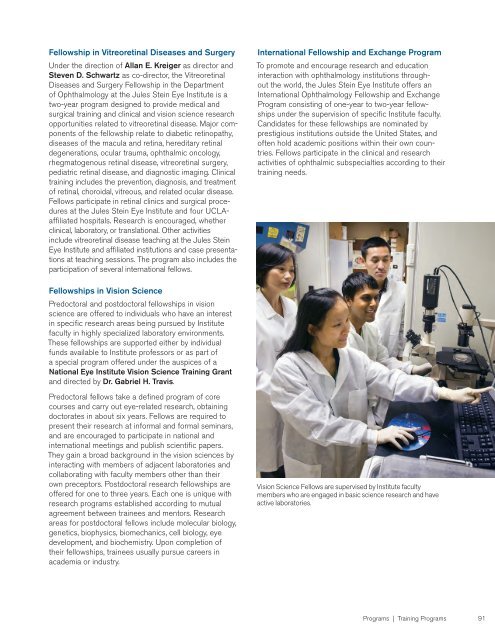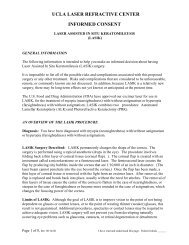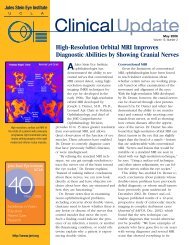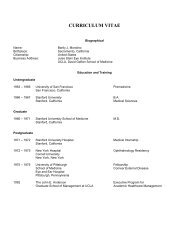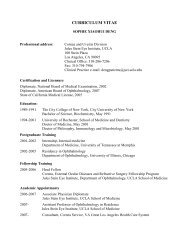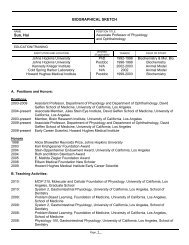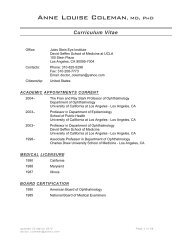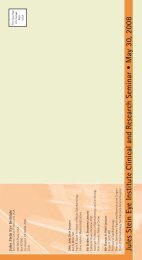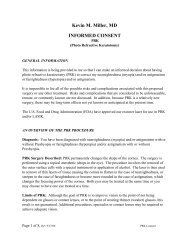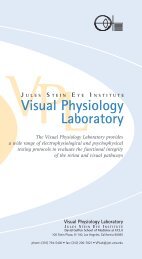View Annual Report - Jules Stein Eye Institute
View Annual Report - Jules Stein Eye Institute
View Annual Report - Jules Stein Eye Institute
Create successful ePaper yourself
Turn your PDF publications into a flip-book with our unique Google optimized e-Paper software.
Fellowship in Vitreoretinal Diseases and Surgery<br />
Under the direction of Allan E. Kreiger as director and<br />
Steven D. Schwartz as co-director, the Vitreoretinal<br />
Diseases and Surgery Fellowship in the Department<br />
of Ophthalmology at the <strong>Jules</strong> <strong>Stein</strong> <strong>Eye</strong> <strong>Institute</strong> is a<br />
two-year program designed to provide medical and<br />
surgical training and clinical and vision science research<br />
opportunities related to vitreoretinal disease. Major com-<br />
ponents of the fellowship relate to diabetic retinopathy,<br />
diseases of the macula and retina, hereditary retinal<br />
degenerations, ocular trauma, ophthalmic oncology,<br />
rhegmatogenous retinal disease, vitreoretinal surgery,<br />
pediatric retinal disease, and diagnostic imaging. Clinical<br />
training includes the prevention, diagnosis, and treatment<br />
of retinal, choroidal, vitreous, and related ocular disease.<br />
Fellows participate in retinal clinics and surgical procedures<br />
at the <strong>Jules</strong> <strong>Stein</strong> <strong>Eye</strong> <strong>Institute</strong> and four UCLAaffiliated<br />
hospitals. Research is encouraged, whether<br />
clinical, laboratory, or translational. Other activities<br />
include vitreoretinal disease teaching at the <strong>Jules</strong> <strong>Stein</strong><br />
<strong>Eye</strong> <strong>Institute</strong> and affiliated institutions and case presentations<br />
at teaching sessions. The program also includes the<br />
participation of several international fellows.<br />
Fellowships in Vision Science<br />
Predoctoral and postdoctoral fellowships in vision<br />
science are offered to individuals who have an interest<br />
in specific research areas being pursued by <strong>Institute</strong><br />
faculty in highly specialized laboratory environments.<br />
These fellowships are supported either by individual<br />
funds available to <strong>Institute</strong> professors or as part of<br />
a special program offered under the auspices of a<br />
National <strong>Eye</strong> <strong>Institute</strong> Vision Science Training Grant<br />
and directed by Dr. Gabriel H. Travis.<br />
Predoctoral fellows take a defined program of core<br />
courses and carry out eye-related research, obtaining<br />
doctorates in about six years. Fellows are required to<br />
present their research at informal and formal seminars,<br />
and are encouraged to participate in national and<br />
international meetings and publish scientific papers.<br />
They gain a broad background in the vision sciences by<br />
interacting with members of adjacent laboratories and<br />
collaborating with faculty members other than their<br />
own preceptors. Postdoctoral research fellowships are<br />
offered for one to three years. Each one is unique with<br />
research programs established according to mutual<br />
agreement between trainees and mentors. Research<br />
areas for postdoctoral fellows include molecular biology,<br />
genetics, biophysics, biomechanics, cell biology, eye<br />
development, and biochemistry. Upon completion of<br />
their fellowships, trainees usually pursue careers in<br />
academia or industry.<br />
International Fellowship and Exchange Program<br />
To promote and encourage research and education<br />
interaction with ophthalmology institutions throughout<br />
the world, the <strong>Jules</strong> <strong>Stein</strong> <strong>Eye</strong> <strong>Institute</strong> offers an<br />
International Ophthalmology Fellowship and Exchange<br />
Program consisting of one-year to two-year fellowships<br />
under the supervision of specific <strong>Institute</strong> faculty.<br />
Candidates for these fellowships are nominated by<br />
prestigious institutions outside the United States, and<br />
often hold academic positions within their own countries.<br />
Fellows participate in the clinical and research<br />
activities of ophthalmic subspecialties according to their<br />
training needs.<br />
Vision Science Fellows are supervised by <strong>Institute</strong> faculty<br />
members who are engaged in basic science research and have<br />
active laboratories.<br />
Programs | Training Programs 91


